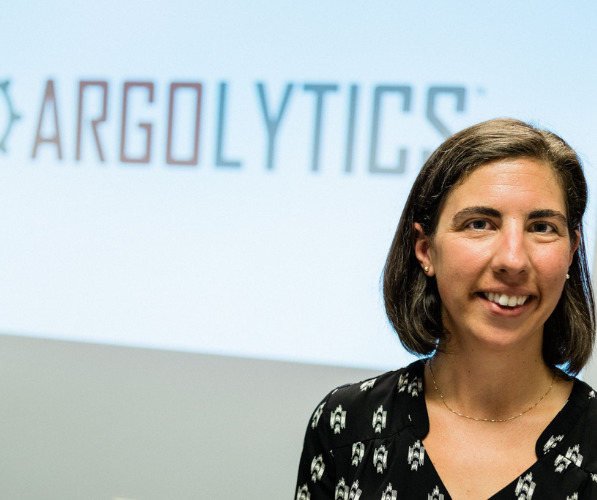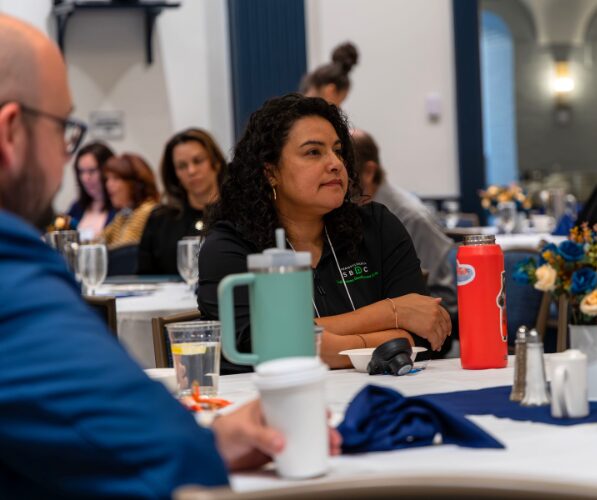Success Story
Local software startup Argolytics participates in NSF I-Corps National Teams program
In her customer-facing role at statistical software company Minitab, Tamela Serensits saw an opportunity to solve a problem she kept seeing her customers encounter again and again.
“Because Minitab has been around for 50 years, every year there’s a new version and it just gets bigger and bigger,” Serensits, who graduated from Penn State University Park in 2001 with a Bachelor’s in animal science, and from Penn State World Campus in 2020 with a Master’s in applied statistics, said. “I kept hearing customers saying they just wanted something really simple that they could use to make these simple quality control analysis reports they needed. I thought, I know how to do that, and I tried to strip down all those advanced statistics to what was really necessary.”
In 2018, Serensits launched Argolytics and flagship product Trendable, a software that enables manufacturers to easily collect, analyze, and report quality-control data.
Small and medium sized manufacturers need to prove to their customers the product they are manufacturing is made to the exact measurements. If a machine shop is making parts for an airplane, for instance, the shop needs to track and measure every aspect of each part produced to ensure the parts will not only fit properly in the airplane, but also safely function.
To prove this, manufacturers use data analysis tools for quality control.
“With Trendable, they can have the essential tools without all the bells and whistles,” Serensits said. “Manufacturers can collect data on a phone and type it right in, and they can actually see it being graphed out in real time, so if the build does start to get close to being out of tolerance, they know immediately and can take corrective action.”
To grow the company, Serensits had participated in local programming, including Happy Valley LaunchBox powered by PNC Bank’s FastTrack Accelerator, Invent Penn State’s Summer Founders Program, and Ben Franklin Technology Partners’ TechCelerator @ State College. Serensits also worked closely with the Penn State Small Business Development Center (SBDC) as she grew her business.
This past spring, Serensits participated in the National Science Foundation’s Innovation Corps (I-Corps) National Teams program – an immersive, entrepreneurial training program that facilitates the transformation of invention to impact for participating teams nationwide. The program consisted of seven weeks of intensive virtual startup training, in which participating teams must complete 100 or more customer discovery interviews.
“Working with Tamela for the last three years, I knew the next step from prior success was to apply and take advantage of the National Teams program to evaluate marketing and commercialization opportunities through customer discovery,” said John Peterson, Business Consultant at the Penn State SBDC. “This path helps entrepreneurs build and strengthen business fundamentals through mentoring and research to identify valuable product opportunities.”
Serensits participated in the program with Penn State Professor of Industrial and Manufacturing Engineering and Bioengineering Hui Yang, as well as Ben Franklin Technology Partners’ Executive in Residence Craig Womeldorf.
“From my initial meeting with them, I knew Tamela and her Principal Investigator, Professor Hui Yang, would be an excellent fit for the I-Corps National Teams program,” said Derek Gross, program manager for the NSF I-Corps program at Penn State. “Tamela was looking for an opportunity to better understand the commercial potential of what she was working on. The National Teams program puts a strong emphasis on arriving at a commercialization plan through speaking with potential customers as well as industry experts.”
Trendable software is currently meant for traditional manufacturing, but more and more manufacturers are starting to work with 3D printers. The team’s objective during the program was to explore how to assure high quality in additive manufacturing, which requires taking into consideration the interior quality of the build, not just the exterior dimensions.
“The National Teams program was super intense, but it was also a lot of fun,” Serensits said. “For us, we were able to come away with the impression that there is room in the 3D-printing world for more solutions for quality control, and now we’re going to pursue a prototype of a possible solution for quality control.”
She said she would recommend any research-based startup to consider the National Teams program and recommends going into the program with one or two conferences or trade shows lined up to attend, where there are hundreds of people in your respective field available to interview.
“My other big piece of advice is to really assemble a cohesive team for the National Teams program,” Serensits said. “The mentor for our team was there for pretty much every interview and came to one of the conferences with us. Our technical lead got a lot out of the experience because of the fact that he wasn’t necessarily talking with people on the commercial side before this. He was mostly familiar with academic circles, so he got a chance to get out there and hear new perspectives. All three team members really worked well together, and that was really key.”
In addition to pursuing additive manufacturing software, she said Argolytics will also continue to develop products in response to customer needs as more and more people begin using the current Trendable software.
Visit the website to learn more about NSF I-Corps programs available at Penn State.
About NSF I-Corps
The NSF I-Corps program uses experiential education to help researchers gain valuable insight into entrepreneurship, starting a business or industry requirements and challenges. I-Corps enables the transformation of invention to impact. The curriculum integrates scientific inquiry and industrial discovery in an inclusive, data-driven culture driven by rigor, relevance, and evidence. Through I-Corps training, researchers can reduce the time to translate a promising idea from the laboratory to the marketplace. Penn State University is part of the NSF I-Corps Mid-Atlantic Hub, a network of universities, NSF-funded researchers, established entrepreneurs, local and regional entrepreneurial communities, and other federal agencies. Hubs work collaboratively to build and sustain a diverse and inclusive innovation ecosystem throughout the U.S.






